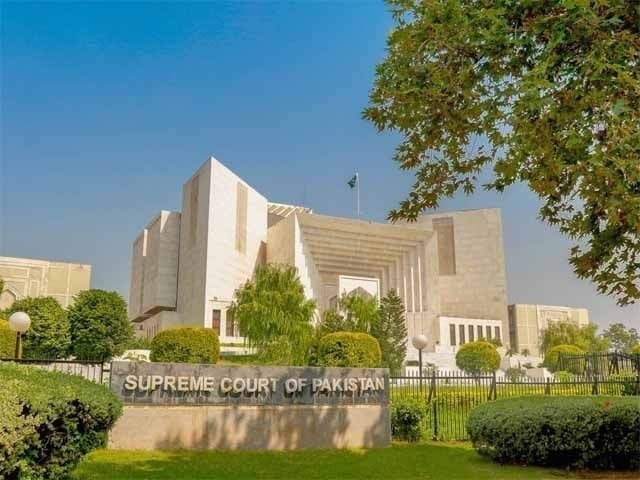Islamabad
The lifetime disqualification of parliamentarians under Article 62(1)(f) of the Constitution was pronounced invalid and illegal by the Supreme Court (SC), which announced its reserved ruling on Monday.

Justices Syed Mansoor Ali Shah, Yahya Afridi, Aminuddin Khan, Jamal Khan Mandokhail, Muhammad Ali Mazhar, and Musarrat Hilali made up the bench that was hearing the case, which was presided over by Chief Justice Qazi Faez Isa. The purpose of the hearing was to determine the period of disqualification for lawmakers.
A majority of 6 votes were needed to pass the decision today; Justice Yahya Afridi was the lone dissenting vote.
If the court rules in favour of Sharif and Tareen, the leaders of the Pakistan Muslim League-Nawaz (PML-N) and the Istehkam-e-Pakistan Party (IPP), will be able to run in the general election on February 8.
A written order issued by the top court stated that Article 62(1)(f) of the Constitution of the Islamic Republic of Pakistan is not a self-executory provision. It does not specify which court of law is to make the declaration mentioned therein, does not provide a procedure for making the declaration, and does not specify any period for disqualification incurred by it.
According to the statement, no statute specifies how to make the disqualifying declaration required by Article 62(1)(f) of the Constitution or how long such a declaration must be to be valid.
The order further stated that “reading into the Constitution” was the correct interpretation of Article 62(1)(f) of the Constitution when it was used to impose a lifetime disqualification on an individual through an implied declaration of a civil jurisdiction court while deciding on certain civil rights and obligations of the parties.”As abridgement of the Fundamental Right of citizens to contest elections and vote for a candidate of their choice enshrined in Article 17 of the Constitution, in the absence of reasonable restrictions imposed by law, is the result of such reading into the Constitution, which goes against the principle of harmonious interpretation of the provisions of the Constitution.”
Article 62(1)(f) of the Constitution, like Article 62(1)(d), (e), and (g), provides a framework within which voters can exercise their franchise until legislation is passed to make its provisions executory, according to the highest court in the land.
“The opinion expressed in Sami Ullah Baloch v Abdul Karim Nausherwani regarding the interpretation of a court’s ruling on a violation of civil rights and obligations as a declaration mentioned in Article 62(1)(f) of the Constitution and the subsequent determination that such a ruling should have a lifelong disqualifying effect is, thus, rejected,” it stated.
In his dissenting opinion, Justice Yahya Afridi upheld the court’s decision in the case of Sami Ullah Baloch v. Abdul Karim Nousherwani.
Respectfully, I find the decision to be incorrect. He went on to say that the scope of a member of parliament’s lack of qualification, as envisioned in Article 62(1)(f) of the Constitution of the Islamic Republic of Pakistan, 1973, is not permanent and will only be effective for as long as the court’s declaration is in force.
Chief Justice of Pakistan Justice Qazi Faez Isa favoured the “original Constitution,” bemoaning “encroachments” made into the country’s bill of rights over the years, and on January 5, the Supreme Court reserved its decision in the matter about the re-examination of the lifetime disqualification of lawmakers under Article 62 (1) (f) of the Constitution.
“The reason these amendments were added to the Constitution is being ignored by us. In a statement made while presiding over a seven-member wider bench, Chief Justice Qazi Faez Isa rejected any alterations that did not improve the people’s well-being, stating that the original Constitution is more sacred than any proposed changes.
The Chief Justice promised to “as quickly as possible” consider a shorter order. I doubt it will happen today, but I pray that it does very soon.
To resolve the discrepancy between previous court rulings and parliamentary legislation, the highest court has decided to step in and decide whether a lawmaker’s disqualification should be for life or the five years specified in the Elections Act.
Former military ruler Gen. Ziaul Haq added Article 62(1)(f) to the Constitution, which leads to the disqualification conundrum. But the matter came to light when a larger Supreme Court bench permanently banned former prime minister Nawaz Sharif in the Panama Papers case.










































